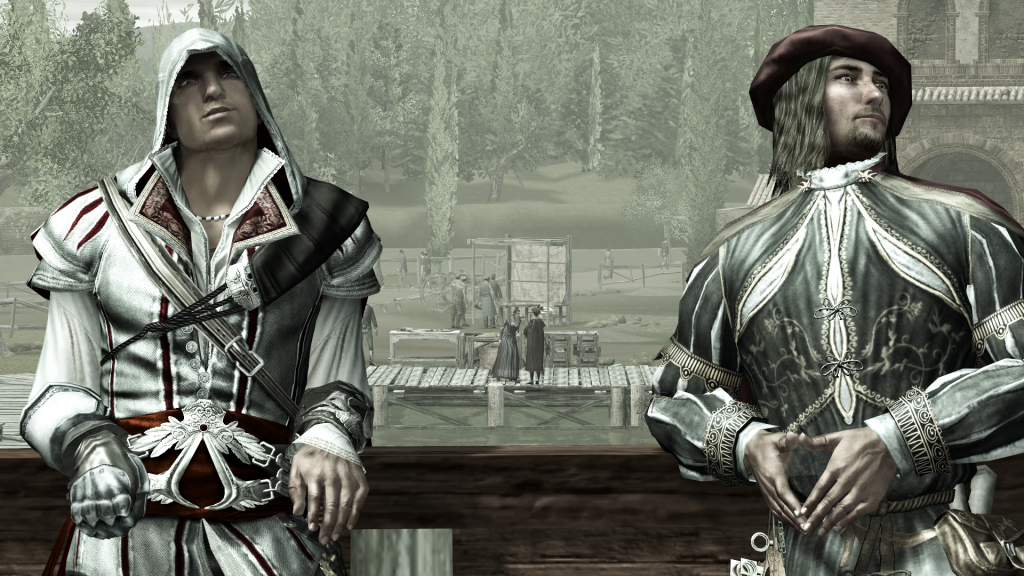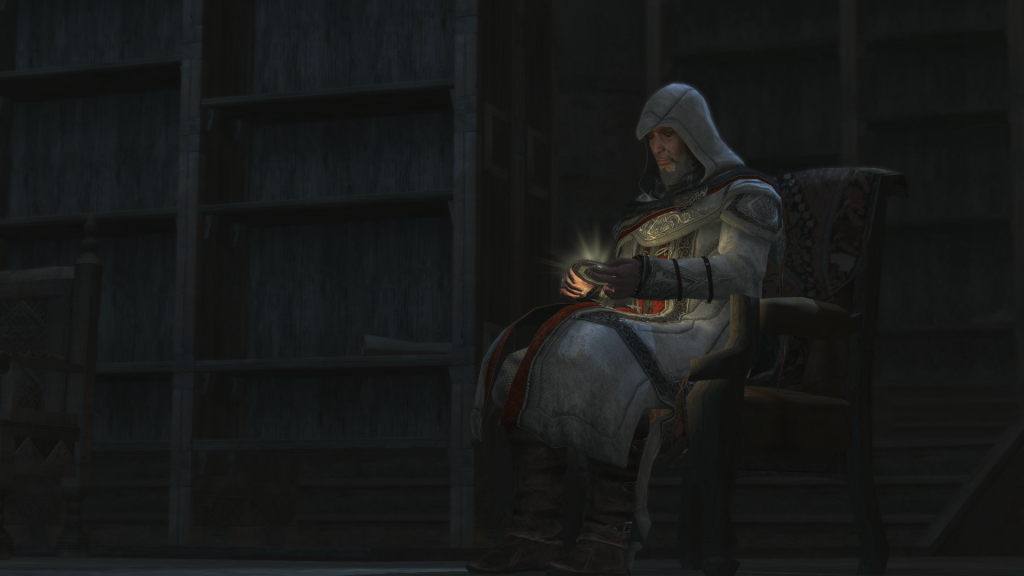Welcome to Assassin’s Creed Week presented by Play the Past, where for a whole week, Play the Past will push content on the most popular historical video game series ever. Part I introduced the Week and asked why Assassin’s Creed mattered, Part II examined slavery and native relations in the series, Part III explored the portrayal of historical women, and Part IV looked at the notion of Grand Narratives and how Assassin’s Creed uses them when making their story. Part V of Assassin’s Creed Week will focus on what it means when the games are wrong.
Nothing is True, Everything is Permitted – The Creed
It was probably already readily apparent when I began this series that I love Assassin’s Creed. It has been one of my favourite series of the last decade and Ubisoft Montreal continues to put out quality games every year. The one thing that everyone is truly wondering about with the series is whether it is good history.
When I first began writing for this series I believed that my answer was going to be a resounding yes. However, it pains me to say that it is not and maybe that’s okay.

Assassin’s Creed II is one of my favourite games of the last generation. When I first began writing about video games and history, this was my go-to game for ideas. I jotted down every fact of history that was presented and then would later do my own research to determine the true accuracy of Ezio’s adventure in Renaissance Europe. Rather than examining every facet of the game front to back, I instead began by looking at specific characters or locations. The first character I turned my attention to was Ezio Auditore’s man behind the curtain, Leonardo Da Vinci.
Each important character in the Assassin’s Creed series receives a database entry that explains some facts about the character. The following is Leonardo’s entry from Assassin’s Creed II with the extra sentence added for Assassin’s Creed: Brotherhood in bold:
Date of Birth: 1452
Profession: Painter, Inventor, Designer, Architect, Scientist, Engineer
The illegitimate son of a notary and peasant woman, Leonardo da Vinci was raised in Tuscany. Like many destined to be superstars, he had no surname, Vinci being the town in which he was born.
At age 14, he was apprenticed to a Florentine painter, Verrocchio who taught him chemistry, drafting, painting, sculpting and modeling. When he was 20, Leonardo established his own workshop, and then travelled across Italy, eventually painting his great masterpieces “The Last Supper” in 1498 and “The Mona Lisa” in 1503-1507.
During his travels, Leonardo studied the world with unquenchable curiosity, recording his observations in mirror writing within his notebooks. While under the employ of Ludovico Sforza and then Cesare Borgia, he created designs for a helicopter, tank, solar power and a calculator, among others. He was also an engineer, designing garrisons, cannons and movable barricades.
Despite this epic list of accomplishments, Leonardo was hounded by his patrons for his chronic procrastination. Pieces frequently took years longer than he anticipated and many were never finished at all.
Leonardo also had a tumultuous love life. Accused of sodomy in 1476, he was most likely homosexual. Salai, his assistant, was accused of stealing and spending too much money on clothes, but was also probably Leonardo’s lover. Leonardo painted several pictures of Salai, including his famous “St. John the Baptist”, and left “The Mona Lisa” to him when he died in 1519.
To the credit of Ubisoft, for the most part Leonardo Da Vinci is very well represented in the game. His demeanour and personality reflect what scholars believe Da Vinci have acted like like, his entry in the database is a solid (albeit brief) synopsis of his life, the game does not hide from Leonardo’s likely homosexuality without expressing it in game, and putting some of his hypothetical war machine designs into usable objects in game adds to the gameplay of Brotherhood.
However, there are some discrepancies with Leonardo’s real life and his Assassin’s Creed‘s representation. In Assassin’s Creed II, Leonardo moves his workshop from Florence to Venice in 1481. This is excellent for gameplay as Ezio spends much of the game after this point in Venice and having his sidekick close by makes things a lot easier for the player. However, from what is known of Leonardo’s life, he lived in Milan during this time not Venice. This is not a small mistake. The developers completely disregarded a key part of Da Vinci’s life in order to help the story. The game attempts to rectify this in a cutscene from a mission in the Downloadable Content pack when Leonardo admits to visiting Milan quite often but it does not change the fact that in order to enhance gameplay, Ubisoft and Assassin’s Creed sacrificed the integrity of their history.

This is but one example of Assassin’s Creed taking liberties in their history and found by someone who is by no means an expert on Renaissance Italy. There are undoubtably many more mistakes or liberties in the series. As was seen in Part II and Part III of this series, the developers of Assassin’s Creed have managed themes like race, colonization and gender within history quite well and from what expertise I have, they represent the history of these eras well. This does not change the fact that there are plenty of instances where history is thrown to the curb for the sake of story and gameplay.
It is no secret that before Assassin’s Creed, video games that tried to be educational about history were generally quite boring. There were some exceptions to this rule like replaying Second World War battles in Call of Duty and Medal of Honor or reliving some of the biggest wars in history with the Total War franchise but none have managed to go so deep into history and not only maintain player interest but thrive like Assassin’s Creed.
This series of games has nearly single handedly sparked the interest in historical integrity in video games. By challenging themselves to work so deeply ingrained in our past, they put the historical community on alert. They have done what so few games had done up until this point, made learning about the past fun for the average person. Moreover, the game is indirectly teaching skills for studying history. According to R.G. Collingwood, a historian must always question and criticize the authorities that have written history before him. With the number of websites, blogs and other digital media questioning the historical validity of Assassin’s Creed, it is clear that this game has inspired people to question the authority of the history they are presenting. Assassin’s Creed should get a pass for its mistake with history but it is important to recognize that even when the series gets in wrong, it has done more to help the study of history than it has to disrespect the past.
If the success and popularity of Assassin’s Creed inspires more to study history or entices more developers to use historical settings that have rarely been used before, then maybe its discrepancies with the past can be overshadowed by its overall impact on the historical community. Maybe in the pursuit of expanding interest in the study of history, everything is permitted.
Thank you to everyone who visited Play the Past for Assassin’s Creed Week. It has been a real pleasure writing all these and I hope they were provocative and enjoyable. A special thanks goes out to Trevor Owens, Ian Milligan, Katherine McGowan, Geoff Hayes and Kirk Goodlet who provided me with inspiration and aid when writing these, whether it was intentional or not.

hey David, great series…i would like to get your opinion on Desmond, and the modern portion of the Assassins Creed storyline?
Thanks very much. I had a lot of fun writing it. What part of the modern portion are you interested in?
the concept of the “Animus” is pretty cool…
there is alot of people that are 50/50 on the modern day storyline…half of the fanbase likes it, half of it hates it……
i for one love it, i feel like it connects all the games togeather, instead of just being self-contained games.
i love all the “meta” stuff in the modern storyline
Ahh I see. I’ve always enjoyed the idea of the animus. Like you said it provides this overarching storyline which allows Ubisoft to connect all these different timelines through a common theme. Without this device it would have been nearly impossible to connect Altair from the Third Crusade and Ezio from Renaissance Italy. Plus, I may be in the minority for this but I LOVED the modern day missions with Desmond in Assassin’s Creed III. However, I found Desmond’s character really dry and boring at times but I feel like there is a lot of opportunity with the modern timeline. I’m really interested to see what they do with their next game and whether the modern day story will be more important than it was in Black Flag.